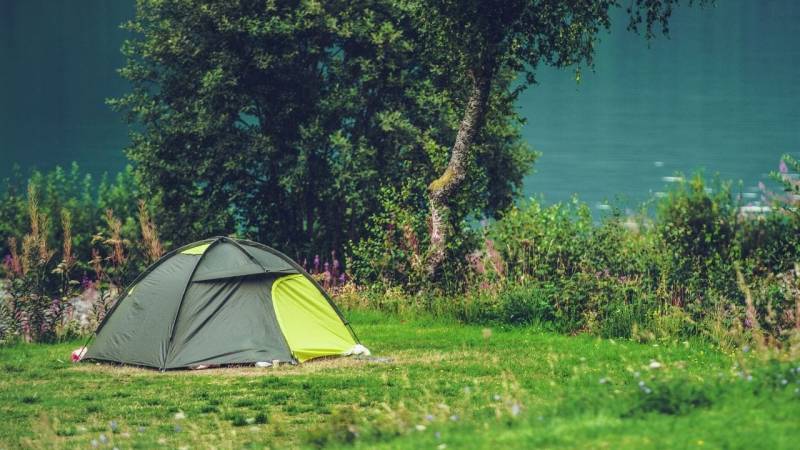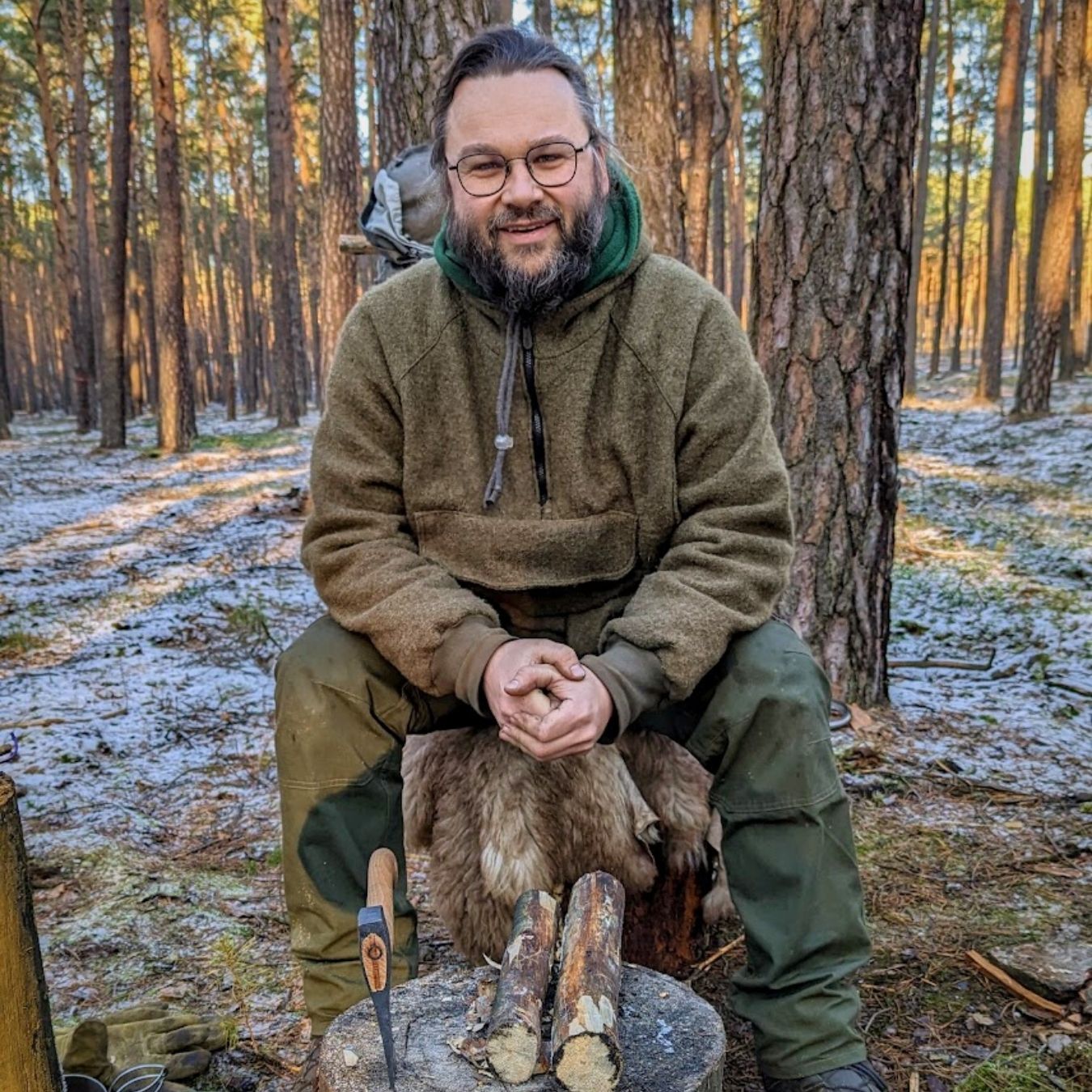
wild camping
Nomen
Meaning
Wild camping refers to the practice of setting up camp in remote and undeveloped areas, away from designated campsites and established facilities. It is a popular activity among outdoor enthusiasts who seek a more immersive and authentic experience in nature. In the context of survival, bushcraft, and wilderness skills, wild camping is an essential skill as it allows individuals to test their self-reliance and adaptability in challenging environments. It requires knowledge of Leave No Trace principles, navigation, shelter building, and foraging. Wild camping offers a unique opportunity to connect with nature, disconnect from modern conveniences, and experience the true essence of the outdoors.

Examples
„I love going wild camping in the mountains, where I can truly disconnect from the hustle and bustle of everyday life.“
„Last summer, my friends and I decided to go wild camping along the river. We found a secluded spot and set up our tents under the starry sky.“
„When you go wild camping, it's important to leave no trace behind. Always remember to pack out what you pack in and respect the natural environment.“
„Wild camping allows you to immerse yourself in nature and experience the true beauty of the wilderness. It's a great way to escape the crowds and find peace and solitude.“
„During our wild camping trip, we encountered a variety of wildlife, from deer grazing nearby to the sound of owls hooting in the distance. It was a truly unforgettable experience.“
Origin
The term "wild camping" originated in the United Kingdom and is commonly used to describe the act of camping in remote and undeveloped areas, away from designated campsites and facilities. It is also known as "wilderness camping" or "backcountry camping" in other parts of the world.
Wild camping has its roots in the long-standing tradition of exploring and experiencing the natural world. It can be traced back to the early days of human civilization when people relied on their survival skills to live off the land. In more recent times, it has become a popular activity among outdoor enthusiasts who seek a deeper connection with nature and a sense of self-reliance.
The practice of wild camping has evolved over time, influenced by various factors such as cultural norms, legal regulations, and environmental concerns. In some countries, wild camping is legally permitted and even encouraged, while in others it may be restricted or prohibited. The rules and guidelines for wild camping can vary widely depending on the location and jurisdiction.
Today, wild camping is often associated with activities such as hiking, backpacking, and bushcraft. It offers a unique opportunity to immerse oneself in the wilderness, away from the crowds and comforts of modern life. It requires a certain level of knowledge and skills, including navigation, shelter building, fire making, and Leave No Trace principles, to ensure a safe and sustainable experience.
Wild camping allows you to disconnect from the hustle and bustle of everyday life and reconnect with the natural world. It offers a chance to experience solitude, serenity, and a sense of adventure. Whether you choose to sleep under the stars, set up a hammock in the woods, or pitch a tent by a remote lake, wild camping provides a truly immersive and unforgettable outdoor experience.
Synonyms
Wilderness camping, Backcountry camping, Primitive camping, Bush camping, Off-grid camping, Stealth camping, Free camping, Dispersed camping
Antonyms
Organized camping, Luxury camping, Glamping, Campground camping, RV camping, Car camping, Family camping, Group camping
Relatives
Camping, Wilderness, Outdoor, Nature, Adventure, Survival, Bushcraft, Hiking
Historical and cultural importance
Wild camping has a rich historical and cultural significance, especially in countries with a strong tradition of outdoor exploration and adventure. It harks back to a time when humans relied on their survival skills to navigate and thrive in the wilderness.
In many indigenous cultures, wild camping was a way of life, with nomadic tribes moving from one location to another, setting up temporary campsites and living off the land. This practice allowed them to intimately connect with nature and develop a deep understanding of their surroundings.
During the early exploration and colonization periods, wild camping played a crucial role in the discovery and mapping of new territories. Explorers and pioneers ventured into uncharted lands, relying on their camping skills to survive in unfamiliar and often hostile environments.
Wild camping also holds cultural significance in the context of recreational outdoor activities. It is seen as a way to escape the constraints of modern life, reconnect with nature, and experience a sense of freedom and self-reliance. Many outdoor enthusiasts and adventure seekers embrace wild camping as a means to challenge themselves, test their survival skills, and forge a deeper connection with the natural world.
Today, wild camping continues to be a popular activity for those seeking an immersive outdoor experience. It allows individuals to disconnect from the comforts of civilization, immerse themselves in the beauty of untouched landscapes, and gain a greater appreciation for the simplicity and resilience of life in the wild.
More information about the term wild camping
What is Wild Camping?
Wild camping is the practice of setting up camp in the wilderness, away from designated campsites or established facilities. It involves immersing yourself in nature and relying on your own skills and resources to survive and thrive in the great outdoors. Unlike traditional camping, wild camping allows you to experience the raw beauty of nature without the constraints of designated areas or modern amenities.
The Appeal of Wild Camping
Wild camping offers a unique and adventurous experience that appeals to outdoor enthusiasts and nature lovers. It allows you to escape the hustle and bustle of everyday life and connect with the natural world on a deeper level. The freedom to choose your own campsite, explore untouched landscapes, and sleep under the stars is what sets wild camping apart from other forms of camping.
Wild camping also provides an opportunity to develop and test your survival skills. It requires you to be self-sufficient and resourceful, as you must rely on your own abilities to find food, water, and shelter. This sense of self-reliance and independence can be incredibly empowering and fulfilling.
Essential Skills for Wild Camping
Before embarking on a wild camping adventure, it is important to acquire certain skills and knowledge to ensure your safety and enjoyment. Here are some essential skills for successful wild camping:
- Navigation: Being able to read maps, use a compass, and navigate through unfamiliar terrain is crucial for finding suitable camping spots and avoiding getting lost.
- Firecraft: Knowing how to start a fire using natural materials is essential for cooking, warmth, and signaling for help if needed.
- Shelter Building: Being able to construct a shelter using natural materials or a lightweight tent is important for protection against the elements.
- Water Sourcing and Purification: Knowing how to find and purify water from natural sources is vital for staying hydrated and preventing waterborne illnesses.
- Foraging and Hunting: Learning about edible plants, mushrooms, and basic hunting techniques can supplement your food supply and enhance your wilderness experience.
Responsible Wild Camping
While wild camping offers a sense of freedom, it is important to practice responsible camping to minimize your impact on the environment and preserve the wilderness for future generations. Here are some guidelines to follow:
- Leave no trace: Pack out all your trash and leave the campsite as you found it.
- Respect wildlife: Observe animals from a distance and avoid disturbing their natural habitats.
- Follow local regulations: Research and adhere to any specific rules or restrictions in the area you plan to camp.
- Be mindful of fire safety: Only build fires in designated areas or use a portable stove to minimize the risk of wildfires.
- Consider the carrying capacity: Avoid overcrowding popular areas and spread out to minimize your impact on the environment.
By practicing responsible wild camping, you can enjoy the beauty of nature while preserving it for future generations to enjoy.
Back to overview

